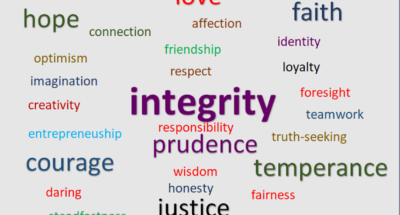Evidence That It Works
In one study, participants were either shown a list of nine words that reflected moral traits or words that denoted everyday household items. Participants in both groups were asked to write the words down four times. Afterwards, participants were asked to take a few minutes to think about the words and then write a brief story about themselves in which they use the words at least once. Upon completion, participants took part in a virtual task, choosing to make investments that benefitted either themselves or a group of which they were part. Participants who wrote about moral traits and who had a strong moral identity—or how important being a good person is to one’s sense of self— were more generous towards others, even after receiving feedback about the selfishness of other participants.
In another study, participants either wrote the name of ten books they had read in high school or the Ten Commandments. (The researchers made the assumption that participants, regardless of religious background or beliefs, would know that the Commandments are a set of moral rules.) Afterwards, participants engaged in a separate task in which they had to solve a series of problems and report how many they got correct. Participants were told that at the end, the experimenter would randomly choose two participants to be rewarded $10 for each problem they solved correctly. Participants in the moral character condition—Ten Commandments—were more honest about their scores than participants in the control group.
Why Does It Matter?
Fostering students’ moral identity not only encourages them to behave in moral ways, but also helps them to create the foundation for a flourishing life. Indeed, research has linked moral identity to greater well-being, meaning in life, and cooperativeness, and a sense of being part of something larger than oneself.
In addition, cultivating moral character in schools can help create more effective and welcoming learning environments. For example, when students cheat, they miss out on an opportunity to gain feedback that could help them identify what information they should focus on. Furthermore, this behavior creates an unfair environment for other students.
Reminders of moral character can help keep students accountable, encouraging them to practice and internalize character strengths of honesty, generosity, and kindness. Such strengths can help students develop strong and meaningful relationships, which are essential to well-being.







Comments